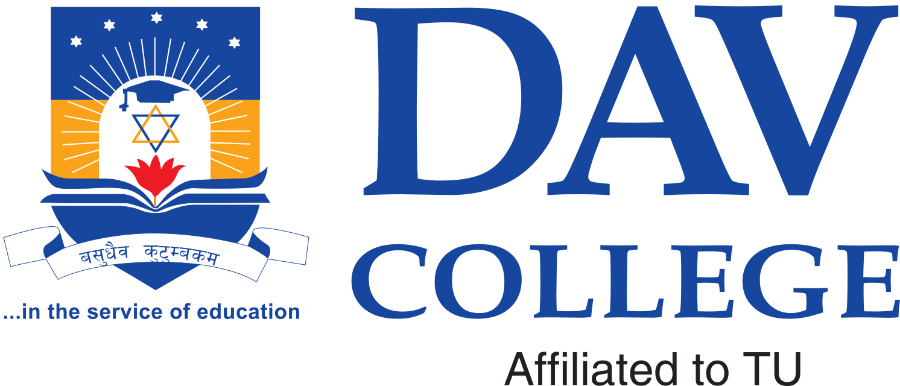BSc Microbiology Syllabus (TU) in Nepal
Published on 2024-07-23

Microbiology is the study of microscopic organisms and their interactions with other living things and their surroundings. It is a broad field with diverse applications. Microbiologists specialize in various aspects of microbiology, studying microscopic organisms and their impact on ecology, human health, and industrial processes.
In Nepal, the course is available in all the universities. DAV College is also one of the best BSc Microbiology College in Nepal. In this article, we will look into the detailed breakdown of the program. Let’s get started.
BSc Microbiology (TU Affiliated) Syllabus Breakdown
|
First Year |
Course number |
Subject title |
Full marks |
|
MB 101 |
General Microbiology |
100 |
|
|
MB 102 |
General Microbiology Practical |
50 |
|
|
Chemistry Theory |
100 |
||
|
Chemistry Practical |
50 |
||
|
Zoology/Botany |
100 |
||
|
Zoology/Botany Practical |
50 |
||
|
Scientific Communication |
50 |
||
|
Total |
500 |
||
|
Second Year |
MB 201 |
Biochemistry and Microbial Biotechnology |
100 |
|
MB 202 |
Biochemistry and Microbial Biotechnology Practical |
50 |
|
|
Chemistry |
100 |
||
|
Chemistry Practical |
50 |
||
|
Zoology/Botany |
100 |
||
|
Zoology/Botany Practical |
50 |
||
|
Applied Statistics |
50 |
||
|
Total |
500 |
||
|
Third Year |
MB 301 |
Molecular Cell Biology |
100 |
|
MB 302 |
Molecular Cell Biology Practical |
50 |
|
|
MB 303 |
Pharmaceutical Microbiology and Quality Management (elective I) |
50 |
|
|
MB 304 |
Bioinformatics (elective II) |
50 |
|
|
Chemistry/Zoology/Botany |
100 |
||
|
Chemistry/Zoology/Botany Practical |
50 |
||
|
Elective I (Chemistry/Zoology/Botany) |
50 |
||
|
Elective II (Chemistry/Zoology/Botany) |
50 |
||
|
Research Methodology |
100 |
||
|
Total |
500 |
||
|
Fourth Year |
MB 401 |
Agriculture and Food Microbiology |
100 |
|
MB 402 |
Agriculture and Food Microbiology Pactical |
50 |
|
|
MB 403 |
Medical and Public Health Microbiology |
100 |
|
|
MB 404 |
Medical and Public Health Microbiology Practical |
50 |
|
|
MB 405 |
Computational course |
50 |
|
|
MB 406 |
Project Writing and Presentation or Methods in Microbiology (applied microbiology) |
100 |
|
|
MB 407 |
Bioinstrumentation (interdisciplinary subject) |
50 |
|
|
Total |
500 |
||
|
Grand total |
2000 |
General Information about the BSc Microbiology Course
The BSc Microbiology course is designed to provide students with comprehensive knowledge and skills in the field of microbiology. Students can choose their desired academic path with Microbiology as their major subject. The course offers several academic combinations:
|
Year |
Course |
Course Contents |
|
First Year |
General Microbiology (101) |
History and development of microbiology, Classification and nomenclature of microorganisms, Scope and applications of microbiology, Morphology of bacteria, Growth and physiology of bacteria, Isolation, enumeration and culture of bacteria, Metabolism, Microbial Genetics, Microscopy and different techniques of handling of microorganisms, Techniques in control of microorganisms, Host-parasite interaction, Introduction to virology, Introduction to parasitology, Introduction to mycology |
|
Second Year |
Microbiology-II (201) |
Living cell and understanding of its biochemical functions, Macromolecules and biomolecules of living cells, Microbial metabolisms, Microbial genetics, Concept of biotechnology, Fermentation process, Agricultural microbial biotechnology, Biotechnology in dairy industry, Methods in genetic engineering, Enzyme Technology |
|
Third Year |
Molecular Cell Biology (301) |
An overview of cells, Cell structure and function, Nucleus, Membrane structure and transport, Structure and organization of actin filaments, The microtubule cytoskeleton, Intracellular transport, Cell signaling, The cell cycle |
|
Third Year |
Pharmaceutical Microbiology and Quality Management (303) (Elective) |
Introduction of pharmaceutical microbiology, Anti Microbial agents, Quality evaluation of pharmaceutical products, Microbial spoilage and preservative of pharmaceutical products, Quality assurance and quality management, Food safety and consumer protection |
|
Third Year |
Bioinformatics (304) (Elective) |
History, scope and importance of bioinformatics, Internet, World Wide Web and NCBI in bioinformatics, Databases, tools and their uses, Sequence alignment, Predictive methods using DNA and protein sequences, Homology, Phylogeny, evolutionary trees and pharma informatics |
|
Fourth Year |
Environment and Public Health Microbiology (401) |
Soil and its constituents, Micro-organisms in soil and their roles, Microbial Ecology, Rhizospheric and phyllospheric microorganisms, Microbial interactions, Microbiology of extreme environments, Biogeochemical cycles and role of microorganisms, Microbial degradation, Bioremediation, Aerobic and anaerobic decomposition of organic compounds and application, Plant pathogens, Microorganisms in various foods, Factors affecting microbial growth in food, Techniques for determination of microorganisms in food, Food handling and spoilage, Food Preservations, Food quality evaluation, Role of Microorganisms in food poisoning |
|
Fourth Year |
Agriculture and Food Microbiology Practical (402) |
Microorganisms present in the soil, Buried slide technique for microbial flora of the soil, Azotobacter, Rhizobium, cellulase produced by organisms, Microorganisms from biofertilizers, Observation of various organisms present in the soil, Differentiation of various organisms from soil samples, Cyanobacteria, Phosphorus solubilizers, Count of micro-organisms in different foods, Dairy products: Milk, cheese and ice-cream, Tests for milk quality, Presence of Microorganisms in meat and meat products, Microorganisms present in fruits |
|
Fourth Year |
Medical and Public Health Microbiology (403) |
Health and disease and epidemiological measurements, Methods of transmission of diseases, Management of diseases, Drinking water microbiology, Waste Management, Microbial air pollution, Historical background of medical microbiology, Normal flora of the human body, Immunity process, Safety measures in clinical laboratory, Methods of specimen collection, transportation, processing and culture of clinical samples for detection of pathogens, Common pathogenic bacteria, Common pathogenic viruses, Medically important fungi, Common pathogenic parasites |
|
Fourth Year |
Medical and Public Health Microbiology Practical (404) |
To perform a bacteriological examination of drinking water, To assess air pollution, To collect and transport various clinical specimens, To perform different staining techniques, To prepare different culture media and monitor their quality, To prepare Biochemical media and reagents for identification of bacteria, To differentiate different types of bacteria from biochemical tests, To perform an enzymatic test of the bacteria, To perform antibiotic susceptibility test of the bacterial isolates, To demonstrate serological tests, To learn various sample collection techniques for the diagnosis of mycotic infections, To prepare fungal culture media, To detect the fungi by microscopic methods, To examine the samples for intestinal and tissue parasites |
|
Fourth Year |
Methods in Microbiology (Applied Microbiology) (405) |
Safety measures in microbiology laboratory, Methods of specimen collection, transportation and processing of clinical samples for bacteria detection, Sample collection and laboratory diagnosis of mycotic infections, Method of collections of samples and processing for detection of parasites, Immunological and serological tests, Method of Collection of water samples and microbiological analysis, Field level tests for disease diagnosis, Molecular tests in microbiology laboratories, Microbiological quality tests of foods, Microbiology laboratory in agriculture, Bioinstrumentation (2076) New Course (407) |
The Objective of BSc Microbiology
The BSc Microbiology course aims to achieve several educational objectives, including:
Comprehensive Mastery: Develop a solid foundation in general microbiology.
Theoretical and Practical Proficiency: Gain the necessary theoretical understanding and practical skills.
Innovation and Contribution: Foster an innovative spirit and contribute to agricultural, medical, and environmental fields.
Expert Consultation: Prepare to provide professional advice and assistance in various microbiological scenarios.
Check out the Scope of BSc Microbiology in Nepal.
Eligibility for BSc Microbiology
To be eligible for the BSc Microbiology course, candidates must:
- Have completed their 10+2 (Higher Secondary Education Board) or ISc from the Physical or Biological group with a minimum aggregate of 50%.
- Have at least a grade C in three subjects at the advanced level from any Board/University recognized by TU or PU.
- Pass the admission exam administered by the respective college.
Admission Requirements
Candidates who meet the eligibility criteria can apply for admission by:
- Obtaining the application form from the college's reception or website.
- Submitting the completed application form along with photocopies of mark sheets and the required fee.
- Appearing in and passing the college's admission exam.
Scope of BSc Microbiology
Graduates of BSc Microbiology have diverse career opportunities in:
- Environmental Microbiology: Study the interactions of microbes with the environment.
- Food, Agricultural, and Industrial Sectors: Work in food production, agriculture, and industries using microbiological techniques.
- Medical Microbiology, Immunology, or Virology: Work in healthcare settings in diagnostic, virology, and immunology laboratories.
- Forensic or Clinical Laboratory Science: Assist in forensic or clinical investigations using microbiological techniques.
